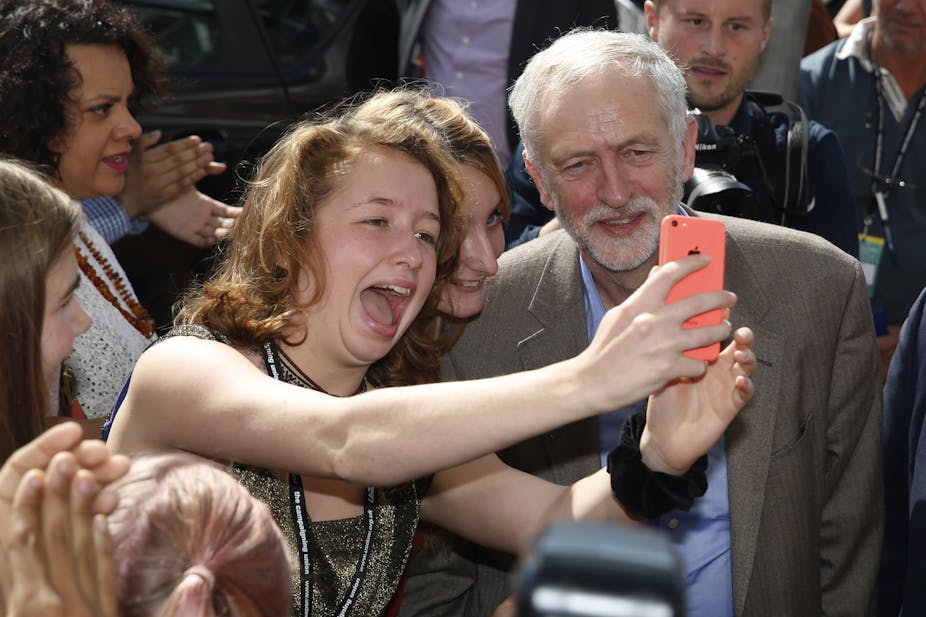In his speech to the 2015 Labour conference, Jeremy Corbyn, the party’s new leader, spoke of a new kind of politics. This includes using social media to spread his message, rather than old media. A team led by deputy leader Tom Watson will be dispatched to work out how to do it. Luckily for him, some evidence is emerging on how you translate online support into real-world action.
There is little doubt that social media played an important role in Corbyn’s success in the leadership election. His Facebook fanpage Jeremy Corbyn for PM has more than 84,000 followers, while his personal page is liked by more than 230,000 people. To put this in perspective, Corbyn still has a way to go before reaching David Cameron, who boasts more than 747,000 likes.
Corbyn seems to be embracing the message of social media enthusiasts, who hail these new forms of communication as democratising forces. Social networking sites such as Twitter played an important role in the 2011 Egyptian revolts and in the 2008 election in Malaysia. And Barack Obama’s 2008 victory in the US election has been attributed in part to a well-run social media campaign. This was not only about mobilising support online but also translating it into actual engagement, such as campaigning, voting and funding.
The answer to all his problems?
Internet activists are sometimes accused of “slacktivism”. They engage on social media because it doesn’t require much effort. They feel good about themselves for being “active” members of society by signing an online petition or liking a post but that doesn’t translate into more meaningful activity. In fact, the fear is that their online clicks actually detract from their willingness to try to make a difference offline.
But we don’t yet really know if that is true. In fact, what little evidence does exist seems to indicate a positive – albeit weak – relationship between being politically active online and offline.
What’s more, social psychologists are beginning to understand what leads people to engage offline in collective action such as writing to a politician, joining a demonstration or signing a petition.
Motivations include the extent to which a person thinks of themselves as being part of a social movement, whether they feel their group has been treated unfairly and whether they think they can make a difference.
These factors do seem to be at play in successful social media campaigns. A survey of 303 people involved in the famous 2012 campaign to trace fugitive warlord Joseph Kony found that on average they did see themselves as being part of a social movement and that by supporting the anti-Kony campaign they were part of a community of like-minded people. The study found that this emergent identity was a crucial reason for their participation.

As was noted in the run-up to the leadership election, Corbyn supporters did develop a strong online community, but so did fans of Ed Miliband prior to his devastating general election loss in May 2015.
The two ingredients which were missing in the general election campaign were the strong moral outrage (emotional reaction to the perception of injustice) and a strong sense of efficacy, which Corbynists so well captured with the hashtag #JezWeCan. It comes therefore as no surprise that more than 160,000 people have translated their online support into joining the ranks of the Labour Party.
Doing what’s right
Another factor that drives collective action is morality. Aside from perceiving injustice, people are willing to act simply because they think it is the right thing to do.
A study on collective action in two different events organised by social movements in Italy (the V Day and the No Berlusconi day) found that the more people participated in online discussion, the more they participated because it was the “right thing to do” rather than because they were angry. Online discussions seem therefore to dissipate anger and give space to moral reasoning to lead the way to collective action.
Opening up online spaces where ideas can spread and deliberation occurs, and engaging in political discussions with the supporters can be an effective means to deliver the “new kind of politics” Corbyn and his followers aspire to.
Whether or not this will be sufficient to win the next general election is hard to tell. Corbyn needs to expand his support, not just consolidate what already exists. Having a strong grassroots base on which to build could certainly help though.

